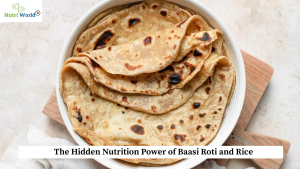The Certificate Course In Paediatric Nutrition from Nutri World provides a thorough look at the dietary needs of children from infancy to adolescence. It covers key topics like growth, feeding practices, nutritional assessment, and common issues such as malnutrition, obesity, and allergies. Participants will learn to create age-appropriate diets and understand nutrition’s role in childhood development. This course is perfect for nutrition students, dietitians, and healthcare professionals aiming to improve their skills in pediatric nutrition.
Join our certification course and develop specialized skills in child-focused meal planning.
Advantages
- Completing a certificate course in pediatric nutrition equips you with specialized knowledge to support children’s dietary needs and growth.
- It expands career opportunities in pediatric clinics, wellness centers, or as a family nutrition consultant.
- You’ll gain practical skills to create meal plans for children with allergies or health conditions.
- The course provides research-based insights on child nutrition and keeps you updated on industry trends.
- It enhances your ability to educate parents and caregivers on healthy eating habits for children.
- You’ll contribute to combating childhood obesity and malnutrition through effective dietary interventions.
- Hands-on training bridges theory with real-world application.
- You can build a strong professional network for collaboration and mentorship.
- This certification opens doors to further specialization or advanced studies, supporting career growth and lifelong learning.
Course Modules
- Module 1: Introduction to Child Nutrition
- Module 2: Dietary Calculation & Menu Splitting Techniques
- Module 3: Nutrition Education and Child & Parent Counseling
- Module 4: Infant Nutrition
- Module 5: Toddler and Preschooler Nutrition
- Module 6: School-Age Children Nutrition
- Module 7: Adolescent Nutrition
- Module 8: Special Dietary Considerations
- Module 9: Disease-Specific Dietary Management
- Module 10: Practical Cooking and Meal Planning
Special Guidance:
Discussion on Commercial Supplementary Health Drinks
Case study Discussion
🔹Additional Skills You’ll Develop
📌 Pediatric Nutrition Knowledge – Help kids eat well and grow healthy
📌 Job Opportunities – Work in children’s clinics, wellness centers, or as a family nutrition guide
📌 Personalized Meal Plans – Develop diets for kids with allergies and health issues
📌 Educating Parents & Caregivers – Teach families about healthy eating for children
📌 Managing Childhood Obesity & Malnutrition – Create effective diet plans
📌 Practical Training – Use nutrition knowledge in real-life situations
📌 Networking Opportunities – Make connections for support and guidance
📌 Path to Advanced Studies – Explore more options for learning and career development
📌 Handle national & international clients with confidence
Step-1
Step-2
Payment Details
A/C No- 0598202100000654
IFSC Code-PUNB0059820
Name - Nutri World
Branch- Punjab National,Kakdwip
Bank - Punjab National Bank
UPI ID: 9647372176-1@okbizaxis
Facebook Link: https://www.facebook.com/20nutriworld
Google Pay :9647372176
Phone Pay: 9647372176

Important Note
AfterPayment take a Screen shot and send us so we can validate your registation, without payment proof your registation will not be activated.
FAQ
1. What is Pediatric Nutrition?
Pediatric nutrition focuses on providing children with the necessary nutrients for their growth, development, and overall health. It includes balanced meals, proper hydration, and essential vitamins and minerals to support brain function, immunity, and physical well-being.
2. Why is nutrition important in early childhood?
Proper nutrition in early childhood supports brain development, strengthens the immune system, prevents nutritional deficiencies, and reduces the risk of chronic diseases like obesity, diabetes, and heart disease later in life.
3. What are the essential nutrients for a growing child?
Key nutrients include:
- Protein (growth and tissue repair) – Found in eggs, dairy, fish, meat, and legumes.
- Calcium (bone development) – Found in milk, yogurt, cheese, and leafy greens.
- Iron (oxygen transport in blood) – Found in meat, beans, lentils, and fortified cereals.
- Vitamin D (bone health) – Found in fortified dairy products, egg yolks, and sunlight exposure.
- Fiber (digestive health) – Found in fruits, vegetables, and whole grains
4. What is the ideal diet for a toddler (1-3 years old)?
A toddler’s diet should include:
- Fruits and vegetables (at least 5 servings daily)
- Whole grains (brown rice, oats, whole wheat bread)
- Dairy (milk, cheese, yogurt for calcium and vitamin D)
- Protein sources (lean meat, eggs, fish, legumes)
- Healthy fats (avocado, nuts, seeds, olive oil)
5. How can I ensure my child gets enough iron?
Iron is crucial for brain development and preventing anemia. Good sources include:
- Lean meats (chicken, beef)
- Iron-fortified cereals
- Green leafy vegetables (spinach, kale)
- Beans and lentils
- Pairing iron-rich foods with vitamin C sources (like citrus fruits) enhances absorption.
6. How much water should a child drink daily?
- 1-3 years: 4 cups (including milk and other fluids)
- 4-8 years: 5 cups
- 9-13 years: 7-8 cups
Encourage water over sugary drinks to promote hydration and overall health.
7. What are healthy snack options for kids?
Healthy snacks include:
- Yogurt with fruits
- Hummus with vegetable sticks
- Nuts and seeds (for older kids)
- Whole-grain crackers with cheese
- Homemade smoothies with milk and fruits
8. Is milk necessary for children?
Milk is an excellent source of calcium and vitamin D, but other sources like yogurt, cheese, fortified plant-based milk, and green vegetables can also provide these nutrients.
9. What are the best foods to boost a child’s immune system?
- Citrus fruits (oranges, lemons, kiwis) for vitamin C
- Nuts and seeds (almonds, sunflower seeds) for vitamin E
- Yogurt and probiotics for gut health
- Leafy greens (spinach, kale) for vitamins and antioxidants
- Protein-rich foods for overall immune function
10. How much sugar should kids have daily?
The American Heart Association recommends:
- Children under 2 years: No added sugar
- Children 2-18 years: Less than 25g (6 teaspoons) of added sugar per day
Limit sugary drinks, candies, and processed snacks.



